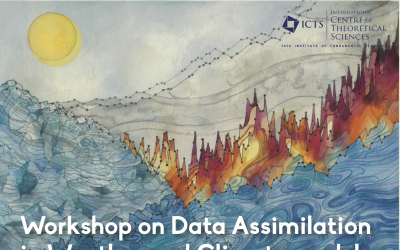Data assimilation is a mathematical approach employed by leading operational weather forecast centers worldwide. Its primary purpose is to estimate the most accurate atmospheric state and its associated uncertainties by integrating observations and short-range forecasts. Data assimilation methodologies extend beyond weather prediction; they play a crucial role in monitoring and comprehending climate and its variability through reanalysis of historical data. This versatile tool is instrumental in investigating processes within the domains of Land, Atmosphere, and Oceans.
The field of Data Assimilation is unfortunately constrained by a scarcity of well-trained scientists and researchers familiar with its theoretical foundations and practical applications. To address this gap, we are organizing a two-week workshop with a specific focus. This workshop aims to provide comprehensive training by introducing fundamental data assimilation theory and facilitating hands-on sessions, particularly focusing on its application
The workshop will encompass a range of key topics, including:
1. Fundamental Concepts: We will delve into the core principles and theory behind data assimilation.
2. Data Assimilation Methods: Participants will gain exposure to various data assimilation methods, such as Optimal Interpolation, 3D-Var, 4D-Var, Kalman filter, and Ensemble Kalman Filter techniques.
3. Uncertainty Estimation: We will cover ensemble data assimilations and techniques for estimating uncertainties.
4. Utilizing Satellite and other Remote Sensing Observations
5. Applications: Explore the diverse applications of data assimilation methods, including their use in land surface studies, oceanography, atmospheric composition, and reanalysis efforts.
By offering this workshop, we aim to equip participants with a comprehensive understanding of data assimilation, fostering expertise in both theory and practical applications, and ultimately contributing to the growth of this crucial research field in India.
Accommodation will be provided for outstation participants at our on campus guest house.
Eligibility Criteria:
Applicants should hold at least a Master’s degree in physics, mathematics, atmospheric science, ocean science or a related discipline. PhD students and Early-career Scientists will be given preference. Knowledge in coding is desirable
ICTS is committed to building an environment that is inclusive, non discriminatory and welcoming of diverse individuals. We especially encourage the participation of women and other under-represented groups.
 workshop
workshop  icts
icts res
res in
in

